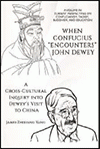
When Confucius "Encounters" John Dewey
A Cross-Cultural Inquiry Into Dewey’s Visit to China
By:
James Zhixiang Yang, BNU-HKBU United International College
A volume in the series: Current Perspectives on Confucianism, Taoism, Buddhism, and Education. Editor(s): Hongyu Wang, Oklahoma State University-Tulsa. Jing Lin, University of Maryland. Heesoon Bai, Simon Fraser University. Xin Li, California State University-Long Beach.
Published 2024
John Dewey’s sojourn to China created a historical moment between the United States and China. Therefore, some of the recent scholarship on the topic aims to uncover the social and historical implications behind Dewey’s Chinese trip, centering on how intercultural conversations occurred between “Confucius” and “John Dewey” during the period of May Fourth/New Culture Movement. Much research also reflects an attempt to synthesize and unify Western and Eastern education.
This book spotlights a cross-cultural “encounter” between Confucius and John Dewey by studying the four well-known Chinese scholars Hu Shih, Liang Shuming, Tao Xingzhi, and Jiang Menglin, who exerted a profound impact on many aspects of Chinese society during the May Fourth/New Culture Movement period. The study explores answers to a crucial question: What motivated Dewey’s Chinese disciples to forge a synthesis of Confucian traditions and Deweyan ideas to purse of the goals of Chinese educational and cultural reformation? Simultaneously, based on an in-depth historical, philosophical, and cultural analysis of Dewey’s visit to China, this study aims to disclose how our education has evolved in the context of cultural pluralism
The book seeks to contribute provocative ideas to today’s educators: any school of thought can renew and update itself if it maintains an open dialogue with a different civilization. Dynamic and transparent intercultural communication enables us to develop a sense of understanding and respect for cultural diversity, all of which are of great benefit to the construction of a stable and healthy international order.
CONTENTS
Acknowledgments. CHAPTER 1: Introduction. CHAPTER 2: Literature Review. CHAPTER 3: From Neo-Confucianism to John Dewey’s Pragmatism: Hu Shih’s Synthesis of Confucian Learning and Dewey’s Thought in the Chinese Literary Revolution. CHAPTER 4: A Dialogue Between “Last Confucian” and “American Confucian”: New Confucian Liang Shuming’s Interpretation of Dewey’s Educational Idea. CHAPTER 5: Life is Education and Unity of Knowledge and Action: Tao Xingzhi’s Transformation of Educational Philosophies of John Dewey and Wang Yangming. CHAPTER 6: Balancing Chinese Education With Western Education: Jiang Menglin’s Fusion of Confucian Learning and John Dewey’s Pragmatism. CHAPTER 7: How China Contributed to Dewey’s Ideas. CHAPTER 8: Conclusion. References. About the Author.
-
Paperback979-8-88730-435-9
Web price: $45.04 (Reg. 52.99)
-
Hardcover979-8-88730-436-6
Web price: $80.74 (Reg. 94.99)
- eBook979-8-88730-437-3

- EDU020000 - EDUCATION: Multicultural Education
- EDU034000 - EDUCATION: EDUCATIONAL POLICY & REFORM: General
- EDU040000 - EDUCATION: Philosophy & Social Aspects
-
 Beyond Single Stories
Changing Narratives for a Changing World
Beyond Single Stories
Changing Narratives for a Changing World
-
 CONFLUENCES Intercultural Journeying in Research and Teaching
From Hermeneutics to a Changing World Order
CONFLUENCES Intercultural Journeying in Research and Teaching
From Hermeneutics to a Changing World Order
-
 Contemporary Daoism, Organic Relationality, and Curriculum of Integrative Creativity
Contemporary Daoism, Organic Relationality, and Curriculum of Integrative Creativity
-
 In Praise of Radiant Beings
A Retrospective Path Through Education, Buddhism and Ecology
In Praise of Radiant Beings
A Retrospective Path Through Education, Buddhism and Ecology
-
 Personal Truths
Youth Utilizing Artmaking to Promote Diversity, Equity, Inclusion, and Belonging
Personal Truths
Youth Utilizing Artmaking to Promote Diversity, Equity, Inclusion, and Belonging
-
 Reflections on People, Policy, and Practices in Curriculum History
Reflections on People, Policy, and Practices in Curriculum History
-
 The Undivided Life
Faculty of Color Bringing Our Whole Selves to the Academy
The Undivided Life
Faculty of Color Bringing Our Whole Selves to the Academy

